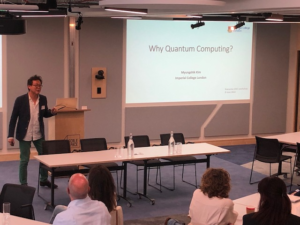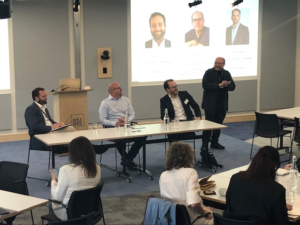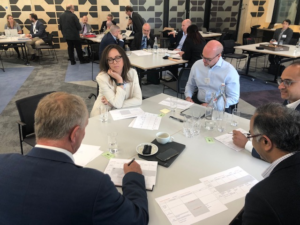This month we had the pleasure of welcoming exclusive guests to an Imperial Business Partners event to explore the 2041 Scenarios, with expert insight and a chance to practice foresight techniques.
When we first conceived the Computation, energy and the planet theme, it was a world that was in the midst of a global pandemic.
Different national and cultural responses to the pandemic had shown us how the global community isn’t always in step, and when it comes to technology, there had already been progress and stagnation in both investment and application. (We’ll look again at the disruptions of our Table of Disruptive Technologies soon…)
Fast forward another 12 months and the political and economic situation has changed once more, yet through the power of foresight, the Scenarios still hold true.
Because of the long-termism of this sort of thinking, no specific or individual policy can disrupt the vision, although the particular outcomes can be altered significantly through regulatory affairs, societal attitudes and scientific breakthroughs.
What was our guiding star?
As mentioned in a previous blog by Claudio about some of our foresight approaches, the guiding star for our work was a cleaner, healthier planet, empowered by the technologies that will advance our computational processes, and the energy that powers them.
With the major industry areas – computing and energy – as the main mountains, our goals, to reach on our way, the Scenarios play out as the different futures that are proposed based on the ‘moves’ on the chessboard of decision making, such as:
- What pace can quantum computing go at?
- When will AI become smart enough to automate itself or much of what we think only we can do?
- How will new materials allow us to rethink energy infrastructure and people’s relationship with energy use?
- What financial or regulatory incentives might enforce quicker or slower adoption of renewable energy and storage facilities?
These were just a few of the questions we worked through during the Scenarios, and we were pleased to hear from the audience that this type of thinking is being undertaken in other businesses too.
The freedom and license to explore things that might have ramifications beyond our lifetime at a company – or the political cycles within which we operate – is vital for true holistic benefits to be achieved, and these are often beyond the control or demand of any one company, sector or industry.
As Nick Price from Imperial Tech Foresight explained to the room, we’re able to take our partners right to the edge of what is possible and plausible, sometimes beyond, and work our way back from the unreachable horizon to the here-and-now, navigating through the things that could happen along the way.
This is just one of the ways we like to do foresight and it does challenge the way that businesses operate, which is why it’s so valuable to have this sort of provocation – without it, companies’ iterative improvements only make minor step-changes towards current goals, rather than anticipating and preparing for the monumental disruption that could happen at any time that is out of current scope.
Bringing it back to the 2041 Scenarios, we wanted to share with our partners the specific sorts of things that Imperial College Research could bring to the party. For that, we handed over to Professor Myungshik Kim to present on Quantum Computing.
Can quantum computing solve all our problems?
In short, no. But it can significantly reduce the time it takes to solve the solvable ones!
Professor Kim, one of the experts featured in our 2041 Scenarios videos, gave an impassioned presentation about the role that quantum can play, and how it is by its very nature disrupting the ways we have to think about the future.
 When contemporary computing first became useful, it was in reality an extension of traditional mechanical processes, doing things faster than manual calculations and therefore able to do many peoples’ work at fractions of the speed. Over time this has increased exponentially, and the language associated with computing is part of the lexicon of everyday life.
When contemporary computing first became useful, it was in reality an extension of traditional mechanical processes, doing things faster than manual calculations and therefore able to do many peoples’ work at fractions of the speed. Over time this has increased exponentially, and the language associated with computing is part of the lexicon of everyday life.
However, as with foresight, there’s huge amounts of knowledge locked up in history, waiting to be explored.
Professor Kim’s inspiration for the deep dive came from the double slit experiment by polymath Thomas Young in the early 1800s. By passing the light of a candle through a piece of paper with two holes, that then projected onto another piece of paper, he had caused ‘interference’, where the light waves interacted and avoided one another.
Without knowing it at the time, he had fundamentally shown quantum mechanics in action – where different things can happen simultaneously to the same thing and achieve different, unpredictable pathways or results.
Thomas Young, incidentally, also made huge inroads into the deciphering of the Rosetta Stone, helping later cryptographers understand some of the characters, and therefore the language, of the ancient Egyptians.
Here, the language barrier had prevented people unlocking the truth about the past. With quantum, it would appear that the language we currently use for computing is insufficient and too limited or the possibilities that quantum presents. We need to create our own Rosetta Stone for shifting the dial if we are to truly unlock the power, both in terms of computational use and societal value, of quantum computing.
Affectionately referred to in a recent biography as ‘The last man who knew everything’, Thomas Young couldn’t have predicted the weight of his findings, or how people would have used them in the future. His role as an empiricist and discoverer of knowledge is not unlike the expertise found in major universities like ours. The difference now is that even the fundamental researchers, such as Professor Kim, understand the impact that their work can have on the world now and in the generations to come.
Insights from uncertainty and navigating through the noise
Decision making under uncertainty, a theme for previous Imperial Business Partners activities and one that we follow closely here at Imperial Tech Foresight, has hit the headlines over the past two and a half years.
The social, political and economic disruption we alluded to earlier has seen winners and losers across the world, but our focus is less on the here-and-now, and more on what this means for the future yet to come.
With Dr Jan-Michael Ross from Imperial College Business School and Dr Jeff Hardy from Imperial’s Grantham Institute – Climate Change and the Environment, we had members of our ‘church’ discussing their practical experiences and how their work with companies has influenced much bigger solutions than the day-to-day operations of an organisation.
Dr Hardy shared how working with energy infrastructure businesses allowed him to be the voice of the customer in the room, making sure that the companies don’t just produce solutions or ideas that solely meet the problem as they see it. Instead, through having pre-mortem analyses and thinking of different scenarios, they could be empowered to take pre-emptive planning.
Whether it was managing risks or capitalising on opportunities, strategic planning and foresight based on plausible, data-led insights has helped make practical interventions. It has meant that through the exploration process, businesses can design effective problem statements and find the data proxies where they don’t have metrics against which to assess their progress.
Importantly, though, it also means companies have to be realistic about their current status. Often, a vision or mission statement is highly aspirational, which is important for identifying what is the star to follow, but when navigating the chessboard to reach the metaphorical mountains, organisations need to be honest and realistic about where they’re starting from.
Dr Ross, who teaches on navigating the trade-offs in decision making when data is scarce or circumstances are uncertain, echoed these thoughts.
Having an entrepreneurial mindset within big organisations and giving people the freedom to play games – literally and metaphorically – can be crucial when mitigating against risk. If all the decision-makers think and act the same, then what happens when circumstances change, new competitors enter the market or regulation and legislation switch up the pieces on the chessboard?
The difficulty in some ways is the size of organisations. Establishing a mindset and culture can be led from the top, but needs to be followed through across the business. If employees are to be empowered to act with agility in these uncertain circumstances, then the policies and processes have to allow for it. Some organisations may be big enough to roll with the punches and weather the storm, but eventually they will also have to accept that times are changing and however well resourced you may be, you’re going to have to play a new game to stay relevant.
Yet those big companies, acting together and with sufficient agreement on direction, can still set the tone for practical and longer-term thinking. Apple disrupted the personal entertainment sector in the early 2000s with the the iPod and follow-up devices, but only with support from suppliers who could help them meet the demand and with regulators and media organisations who cracked down on illegal downloads.
That opened the door for further disruption, such as Netflix changing the decades-established video rental market, while gaming companies who had previously been priced out of personal entertainment because of a dominance from major games and device manufacturers (such as Sony, Nintendo and SEGA) now had a direct route-to-market through the AppStore.
Using history as a way to infer possible futures, it’s clear to see how foresight and creating scenarios help with addressing the ambitious aims. At the height of the console wars, who would have thought that not only were the cartridges no longer going to be used or controllers weren’t going to be attached by wires, but that anyone anywhere in the world could play against one another, and that they could do so on devices made by competing manufacturers?
Scenario planning has helped companies like the National Grid (although these may have been more constrained than was then useful), while some of the Imperial Business Partners members in the audience also shared their experiences of how creating a narrative to guide thinking helped the senior leadership take the bold decisions that would ultimately drive the companies forward.
Putting theory into practice: Wind tunnelling
We rounded out the session on Wednesday with a practical exercise – wind tunnelling. It’s a technique that we use with partners to work through the STEEPV framework, looking at 1-3, 3-10 and 10+ year timescales, which is a quick way to get the ideas flowing.
Focusing on a specific company within an industry, or in this instance with a low-cost airline in the USA, we collectively look at whether the company has a specific want or need to change its future, or if not, how it’s going to stay relevant in the face of disruption from others.
Sometimes the exercise doesn’t necessarily lead to actions that companies need to take, but rather steps that they should avoid or scenarios that they need to prepare to mitigate as and when new competitors enter their market.
In the case of the airline, some of the ideas shared by our participants were fascinating – from improving the experience of flying through to reconsidering what the purpose of travel is, and therefore where partnerships might be sought with other transport providers in different regions.
The group collectively made assumptions that flying would be phased out for business audiences, because of corporate backlash while the aviation industry tackles its contributions to climate change (something the new Brahmal Vasudevan Institute for Sustainable Aviation at Imperial is aiming to address), and that fuel and vehicles would need to be rationed or rented, therefore potentially seeing individual companies’ fleets cut down and groups of aviation companies pooling their planes together – cheaper than mergers and acquisitions, and much cheaper than owning and maintaining vehicles that might need to be grounded for extended periods. Insurers would also likely be happy with this outcome!
Interested in knowing more?
Imperial Tech Foresight is foresight backed with the scientific community of Imperial College London. Get in touch to learn more about the possibilities, challenges, and opportunities ahead.